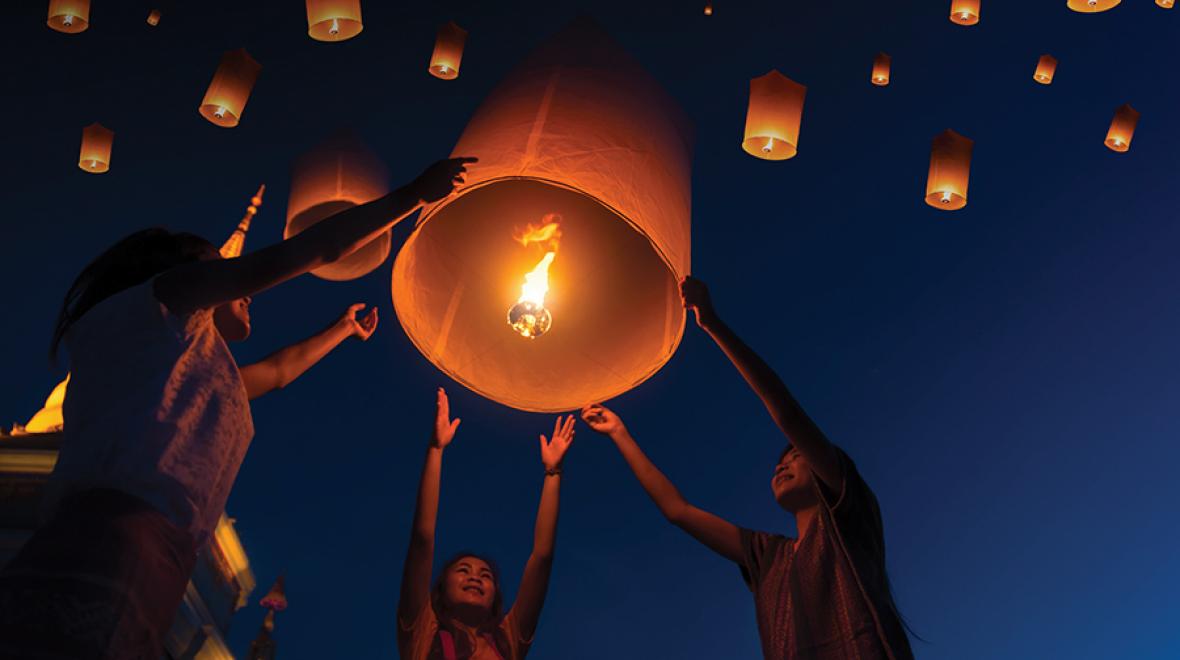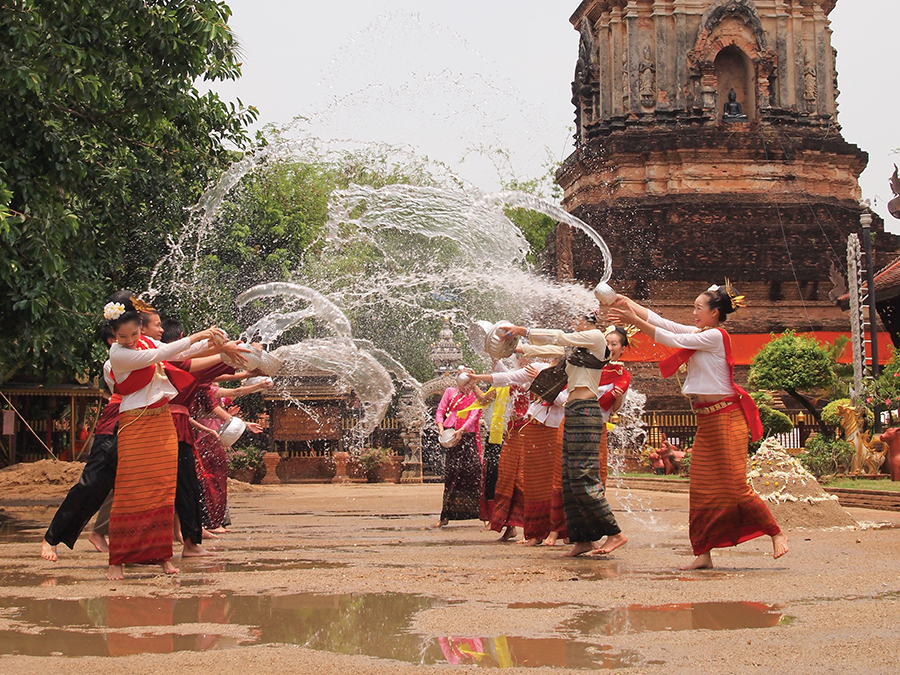
New year, new you. Or so they say. The idea of new beginnings is perennially appealing. But after the nonstop rush that starts with the first day of school and ends with ringing in the new year, some of us need time to recover from the holiday hangover before making a fresh start.
Fortunately, the only thing that has to change on Jan. 1 is your paper calendar. What we think of as the “calendar year” was established in 1582 under Pope Gregory XIII and restored the Roman Empire’s choice of Jan. 1 as the start of the new year in Catholic Europe. But the Gregorian calendar didn’t catch on in Britain and the American colonies (where the year began in March) until 1752. Other cultures around the world have their own, perhaps better, times to start the new year. So, if the things you resolve to do tend to dissolve by Jan. 15 or if you need a do-over for any other reason, we’ve rounded up a year’s worth of new beginnings.
January
The Old New Year
Julius Caesar established the first day of January as the beginning of the new year in 46 B.C. The 304-day Julian calendar was eventually replaced for secular matters, but many Orthodox Christians around the world still use the Julian calendar to determine holidays. According to the Julian calendar, the new year falls on Jan. 14 in 2023. Often called the Old New Year, Orthodox New Year is celebrated in Georgia, Russia, Ukraine and in Orthodox communities around the world.
Lunar New Year
Chinese New Year is perhaps more appropriately called Lunar New Year, because it is not unique to China. Lunar New Year is the biggest holiday of the year in many countries throughout Asia. Called Spring Festival in China, Tết in Vietnam and Seollal in Korea, the precise date of the Lunar New Year moves around on the calendar. Or, more precisely, the dates move around, because Lunar New Year is a weeks-long holiday for which ritual preparations begin on Jan. 14 this year. The first day of the Year of the Rabbit is Jan. 22.
February
Lantern Festival
Because it follows the lunar calendar, in many years, the Chinese Spring Festival (Chun Jie) begins in February and ends in March with the Lantern Festival. But in 2023, the Lantern Festival closes out the holiday on Feb. 5, when people light lanterns and visit friends.
March
Nowruz
Celebrated on the astronomical vernal equinox, which is March 21 in 2023, Nowruz means “new day.” Its spelling and pronunciation may vary, as Nowruz is celebrated in the Balkans, the Caucasus, the Middle East and throughout the Persian diaspora. Rooted in Zoroastrianism, the holiday celebrates the return of spring as a victory over darkness with ritual celebrations that focus on fertility and new life. Like many new year traditions, Nowruz activities begin well in advance of the day itself.
Balinese Hindu New Year
Another lunar-based holiday, Nyepi is a public holiday that will be celebrated on March 22 in Indonesia this year, but in the province of Bali, Nyepi is part of a weeklong Balinese Hindu New Year celebration marked with religious ceremonies and festive events, such as the ogoh-ogoh parade. The unique aspect of celebrating the holiday in Bali is the day of Nyepi, which is marked by a 24-hour period of silence and meditation. Hindu tradition says the ritual causes demons to pass the island by, but Balinese people of all faiths practice and benefit from the day of peaceful retreat. Ugadi, also observed on this day, is the Hindu New Year celebrated in the states of Andhra Pradesh, Telangana and Karnataka in India.
April

Songkran
The traditional Thai New Year is called Songkran, celebrated April 13–15. The holiday expresses traditional Thai values of family, society and religion through social gatherings and visits to temples, where donations are made to the monks. Among the unique traditions of Songkran is splashing people with water in the hopes of a good rainy season. Songkran water is often scented, and though the act can be playful under the right circumstances, sprinkling water is done as a sign of respect to Buddha and to elders.
Tamil New Year
Celebrated on April 14 this year, Puthandu, also known as Puthuvarudam, is the first day of year on the Tamil Hindu calendar and it is traditionally celebrated as a festival by Tamil Hindus in Southern India and Sri Lanka. People decorate the ground in front of their homes with colorful geometrical line drawings called kolam, which are made of powdered rice flour; and in some places, cows are adorned with flowers and paraded through town. Sri Lankan Sinhalese celebrate their new year, Aluth Avurudda, on the same day.
May
Although many cultures peg their new year to springtime, May seems to be late enough in the season to miss the new year rush. But if you’re hankering for a new beginning in May, there are some creative options. May is Creative Beginnings Month, so feel free to freelance your own new year tradition to celebrate in May.
June
Andean New Year
Here in Seattle, June 21 marks the summer solstice, a celebration of the longest day of the year. But in South America, June 21 is the winter solstice. The Aymara people of Bolivia celebrate the longest night of the year with a vigil until the new day brings the beginning of a new year. In Peru, a reenactment of the Incan Festival of the Sun, Inti Raymi, is held around the time of the solstice.
July

Muharram
Muharram begins after the sighting of the new moon on the final day of the Islamic lunar Hijri calendar. In 2023, it will start on the evening of July 18 and end at sundown on Aug. 17. The entire month is deeply holy, but the actual beginning of the year is generally of less importance than the 10th day, Ashura, when some people observe mourning rituals commemorating the death of the Prophet Muhammad’s grandson, Hussein ibn Ali. Solemn days of fasting and prayer are more widespread, with fasts broken by sweet foods and family gatherings.
August
Bérchules New Year
It looks as though the only place where the new year is routinely celebrated in August is in the small town of Bérchules in Andalusia, Spain. On New Year’s Eve in 1994, a power outage left the entire town all dressed up with no place to go. At a town meeting a few weeks later, citizens vented their anger at the electric company; they then came up with an idea for local businesses to recoup their losses with a rescheduled celebration during peak tourist season. Thus Bérchules New Year was born, and the town has celebrated New Year’s Eve on Aug. 6 ever since.
September
Enkutatash
Ethiopia, which uses a unique calendar, will celebrate its new year, Enkutatash, on Sept. 12 this year. The Amharic word Enkutatash translates to “gift of jewels,” and derives from the story of the Queen of Sheba, who presented jewels to King Solomon. The holiday marks the transition from the season of rain to the one of sunshine and is celebrated by attending church, eating meat-focused meals and conducting coffee ceremonies. Children go door to door, receiving praise and gifts.
Rosh Hashana
Rosh Hashana is the Jewish New Year, which begins at sundown on Sept. 15 and ends at nightfall on Sept. 17 in 2023. It is both a celebration of new beginnings and a time of sincere reflection on the past year. It presents an opportunity to review one’s choices and repent, symbolically casting off sins by tossing bread into a body of water. In addition to praying and attending religious services, feasting takes place on both days, with sweet foods to symbolize a sweet new year.
October
Samhain
The witches’ new year, Samhain (pronounced sah-win), is celebrated at the midpoint between the fall equinox and the winter solstice, and it coincides with Halloween. Modern Wiccans revived the ancient Celtic harvest holiday as the end of one cycle and the beginning of a new one on the Wheel of the Year. Samhain is marked by honoring loved ones who have died and taking (literal and metaphorical) stock of the fruits of the past year.
November
Diwali/Marwari New Year
Diwali is a major Hindu holiday celebrated throughout India and beyond, but in the Indian states of Gujarat and Rajasthan, Diwali also coincides with the new year. In 2023, Diwali falls on Nov. 12, and the new year of the Vikram calendar begins on Nov. 14. Diwali is a festival of lights, celebrating the triumph of good over evil. Firecrackers are a major component of modern Diwali celebrations.
December
Soyal
For the Native American Hopi and Zuni people, the winter solstice on Dec. 21 marks the turning of the year with Soyal. Through rituals and sacred dance, they celebrate the return of the sun and the renewal of life. While its ceremonies are sacred and private, Soyal is also associated with gifts and blessings — a nearly universal aspect of new beginnings in every culture.











